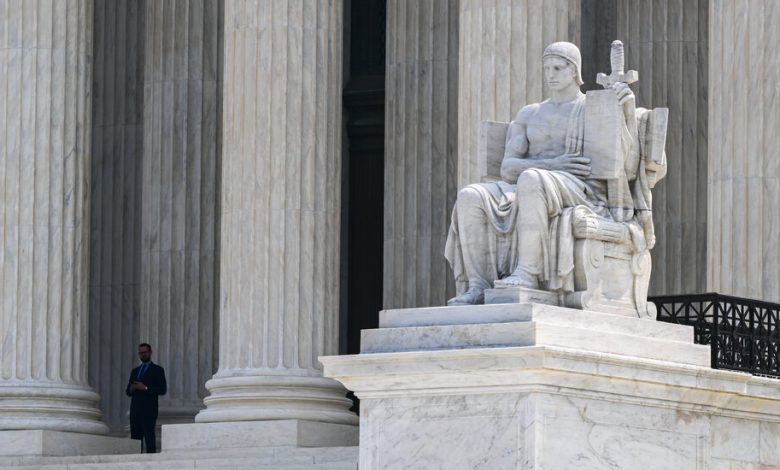On First Day of New Term, Supreme Court Hears Debate Over First Step Act

In its first argument of the new term, the Supreme Court heard a case on Monday that explored a provision of a law aimed at reducing prison sentences for certain nonviolent drug crimes.
The case focused on part of the First Step Act, bipartisan legislation passed in 2018 aimed at rolling back tough sentencing laws that had caused the country’s prison population to balloon.
Under what is known as the “safety valve” provision, judges could disregard mandatory minimum sentences for people convicted of certain nonviolent drug offenses who had limited criminal history.
At issue is how to interpret a part of the law that determines who is eligible for this provision, which could potentially lead to a shorter sentence. Three requirements under the provision involve prior criminal history, and the court is being asked to decide whether people no longer qualify if they meet one of these criteria — or if they must meet all three.
The court’s ruling will affect thousands of people in federal prison and their families who hope to benefit from the law aimed at reducing both the human and the financial costs of incarceration.
Justice Ketanji Brown Jackson, the first justice in the modern court to have worked as a public defender, zeroed in on the practical consequences of the law during an argument that hinged on grammatical interpretation.
“It’s a criminal statute with huge implications for the lives and well-being of the people who come through the system,” said Justice Jackson, who also worked for the United States Sentencing Commission, which studies and develops sentencing policies for the federal courts.
A report by the sentencing commission published in 2017, before the First Step Act passed, found that drug offenses were the most common types of crimes to include mandatory minimum sentences. Nearly half of all federal inmates were convicted of drug offenses, according to the report.
The case was a muted start for the court’s new term, although the justices have been under intense scrutiny over their ethics after revelations that some of their colleagues had failed to disclose luxury travel and gifts.
The case on Monday, Pulsifer v. United States, No. 22-340, involves a man, Mark E. Pulsifer, who was accused of twice selling methamphetamine to a confidential informant in southwest Iowa.
A federal grand jury indicted him in 2020 in the U.S. District Court for the Southern District of Iowa. Mr. Pulsifer later pleaded guilty to a single count of distributing at least 50 grams of methamphetamine. He had a prior drug conviction from 2013 in Iowa for possessing a controlled substance with intent to distribute.
Mr. Pulsifer faced a mandatory minimum sentence of 15 years in prison. But if he qualified for relief under the “safety valve” provision of the First Step Act, his sentence could be as low as eight years.
The justices grappled with the underlying facts of his case, especially Mr. Pulsifer’s age.
“He was over 60 years old when he’s sentenced, so we’re talking about whether he might be free when he’s 70, 73 or 75,” said Justice Neil M. Gorsuch. “Is that what we’re — what’s really at stake here?”
Shay Dvoretzky, who represented Mr. Pulsifer, said that regardless of his age, his client would serve a prison term. “He’s a 60-year-old offender,” Mr. Dvoretzky said. “Nobody is talking about him not serving a serious prison term.”
Justice Brett M. Kavanaugh pushed back on the focus on age: “Would you have a different rule for a 22-year-old offender?”
Justice Kavanaugh also asked Mr. Pulsifer’s lawyer to explain how many individual uses or doses of methamphetamine Mr. Pulsifer sold, adding, “I’m sure you acknowledge meth is a serious problem in many communities in the United States.”
During lower-court proceedings, Mr. Pulsifer’s lawyers had argued that he qualified for relief under the First Step Act, but a federal judge in Iowa disagreed.
The U.S. Court of Appeals for the Eighth Circuit sided with the lower court.
Lawyers for Mr. Pulsifer argue that the lower courts misread the law.
“Plain meaning, context and purpose — not to mention Occam’s razor — all point to the same conclusion: ‘And’ means ‘and,’” they wrote in a brief to the court. “Ordinary English speakers understand that ‘and’ means ‘and,’ not ‘or.’”
In argument on Monday, a lawyer for Mr. Pulsifer also pointed to the purpose of the First Step Act, which sought to redress harsh sentences of the past.
“This was a once-in-a-generation sentencing reform, passed in a bipartisan manner, signed by President Trump, where the motivating force here was to move away from mandatory minimums,” Mr. Dvoretzky said.
He pointed to a legal principle that requires courts to read ambiguous criminal laws in favor of liberty, not incarceration.
Federal prosecutors disagreed, arguing in their brief that “a court must find that a defendant satisfies all three of those criteria in order for the defendant to be eligible for safety-valve relief.”
Despite the high stakes for criminal defendants, Justice Samuel A. Alito Jr. acknowledged the thorny, technical nature of the arguments.
“Everybody I assume in this courtroom today speaks the English language, and all we’re trying to do is understand some words in the English language,” Justice Alito said. “It just seems to me that a lot of these arguments that we’ve heard, I mean, the people here who haven’t studied the case must think this is — this is gibberish.”





